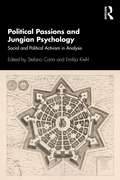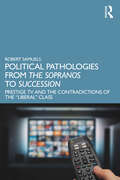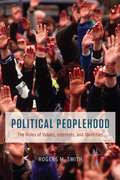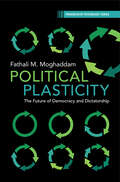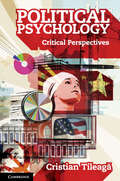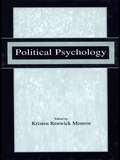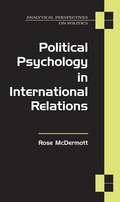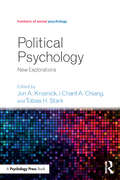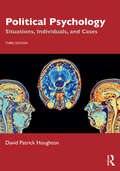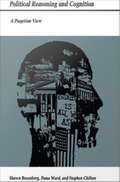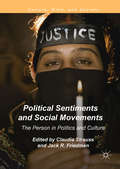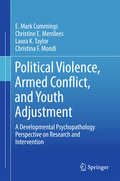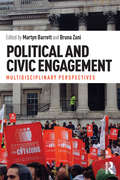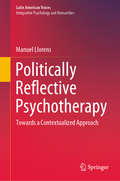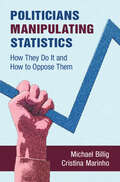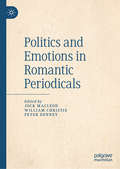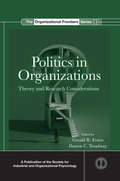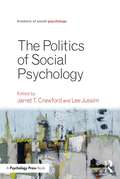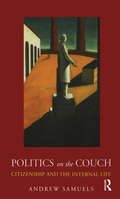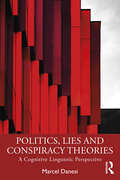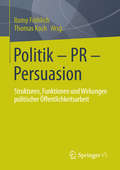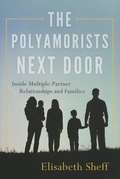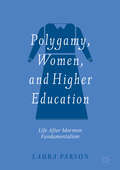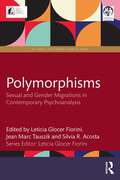- Table View
- List View
Political Passions and Jungian Psychology: Social and Political Activism in Analysis
by Stefano Carta; and Emilija KiehlIn this book, a multidisciplinary and international selection of Jungian clinicians and academics discuss some of the most compelling issues in contemporary politics. Presented in five parts, each chapter offers an in-depth and timely discussion on themes including migration, climate change, walls and boundaries, future developments, and the psyche. Taken together, the book presents an account of current thinking in their psychotherapeutic community as well as the role of practitioners in working with the results of racism, forced relocation, colonialism, and ecological damage. Ultimately, this book encourages analysts, scholars, psychotherapists, sociologists, and students to actively engage in shaping current and future political, socio-economic, and cultural developments in this increasingly complex and challenging time.
Political Pathologies from The Sopranos to Succession: Prestige TV and the Contradictions of the “Liberal” Class
by Robert SamuelsPolitical Pathologies from The Sopranos to Succession argues that highly praised prestige TV shows reveal the underlying fantasies and contradictions of uppermiddle-class political centrists. Through a psychoanalytic interpretation of The Sopranos, Breaking Bad, The Wire, House of Cards, Dexter, Game of Thrones, and Succession, Robert Samuels uncovers how moderate “liberals” have helped to produce and maintain the libertarian Right. Samuels’ analysis explores the difference between contemporary centrists and the foundations of liberal democracy, exposing the myth of the “liberal media” and considers the consequences of these celebrated series, including the undermining of trust in modern liberal democratic institutions. Political Pathologies from The Sopranos to Succession contributes to a greater understanding of the ways media and political ideology can circulate on a global level through the psychopathology of class consciousness. This book will be of great interest to academics and scholars considering intersections of psychoanalytic studies, television studies, and politics.
Political Peoplehood: The Roles of Values, Interests, and Identities
by Rogers M. SmithFor more than three decades, Rogers M. Smith has been one of the leading scholars of the role of ideas in American politics, policies, and history. Over time, he has developed the concept of "political peoples," a category that is much broader and more fluid than legal citizenship, enabling Smith to offer rich new analyses of political communities, governing institutions, public policies, and moral debates. This book gathers Smith's most important writings on peoplehood to build a coherent theoretical and historical account of what peoplehood has meant in American political life, informed by frequent comparisons to other political societies. From the revolutionary-era adoption of individual rights rhetoric to today's battles over the place of immigrants in a rapidly diversifying American society, Smith shows how modern America's growing embrace of overlapping identities is in tension with the providentialism and exceptionalism that continue to make up so much of what many believe it means to be an American. A major work that brings a lifetime of thought to bear on questions that are as urgent now as they have ever been, Political Peoplehood will be essential reading for social scientists, political philosophers, policy analysts, and historians alike.
Political Plasticity: The Future of Democracy and Dictatorship (Progressive Psychology)
by Fathali M. MoghaddamPolitical plasticity refers to limitations on how fast, how much, and in what ways political behavior does (or does not) change. In a number of important areas of behavior, such as leader-follower relations, ethnicity, religion, and the rich-poor divide, there has been long-term continuity of human behavior. These continuities are little impacted by factors assumed to bring about change such as electronic technologies, major wars, globalization, and revolutions. In addition to such areas of low political plasticity, areas of high political plasticity are considered. For example, women in education is discussed to illustrate how rapid societal change can be achieved. This book explains the psychological and social mechanisms that limit political plasticity, and shape the possibility of changes in both democratic and dictatorial countries. Students, teachers, and anyone interested in political behavior and social psychology will benefit from this volume.
Political Psychology
by Cristian TileagThis book provides an introduction to political psychology through a focus on European politics and topics. It describes a style of doing political psychology in Europe that has developed out of dialogue with as well as critique of North American approaches. By emphasising the theoretical and methodological diversity of political psychology, the book is intended to contribute to a greater understanding of the strength and utility of the field. - Opens up and extends the study of political psychology to a variety of socio-political contexts and manifestations of political behaviour - Clearly outlines the usefulness and promises of distinctive critical approaches in social and political psychology - Explicitly considers the role of language, communication, identity and social representations in the construction of political meanings. Political Psychology will appeal to upper-level students and scholars who seek to extend their knowledge of the complex relationship between psychology, politics and society.
Political Psychology
by Kristen Renwick MonroeWith a list of contributors that reads like a "Who's Who" of political psychology, this comprehensive volume introduces the major concepts, debates, and themes in the field and provides an overview of its intellectual development, its disparate parts, the major controversies and some suggestions for the future direction of the field.
Political Psychology in International Relations
by Rose McdermottA comprehensive account of the field of political psychology with a focus on its implications for international relations
Political Psychology: New Explorations (Frontiers of Social Psychology)
by Jon A. Krosnick, I-Chant A. Chiang, and Tobias H. StarkIn recent decades, research in political psychology has illuminated the psychological processes underlying important political action, both by ordinary citizens and by political leaders. As the world has become increasingly engaged in thinking about politics, this volume reflects exciting new work by political psychologists to understand the psychological processes underlying Americans’ political thinking and action. In 13 chapters, world-class scholars present new in-depth work exploring public opinion, social movements, attitudes toward affirmative action, the behavior of political leaders, the impact of the 9/11 attacks, and scientists’ statements about global warming and gasoline prices. Also included are studies of attitude strength that compare the causes and consequences of various strength-related constructs. This volume will appeal to a wide range of researchers and students in political psychology and political science, and may be used as a text in upper-level courses requiring a scholarly and contemporary review of major issues in the field.
Political Psychology: Situations, Individuals, and Cases
by David Patrick HoughtonWhat shapes political behavior more: the situations in which individuals find themselves, or the internal psychological makeup—beliefs, values, and so on—of those individuals? This is perhaps the leading division within the psychological study of politics today. Political Psychology: Situations, Individuals, and Cases, 3rd edition, provides a concise, readable, and conceptually organized introduction to the topic of political psychology by examining this very question. Using this situationism—dispositionism framework—which roughly parallels the concerns of social psychology and cognitive neuroscience—this book focuses on such key explanatory mechanisms as emotion, cognition, neuropolitics, genopolitics, personality, beliefs and social identities to explore topics ranging from voting behavior and racism to terrorism and international relations.The new edition is completely revised and contains new chapters to introduce and conclude the book, as well as fundamentally updated material on (for instance) foreign policy decision-making and electoral choice. Houghton has also updated the text to bring us into the era of Donald J. Trump, to pick apart the results of the 2024 US presidential election, and to include up-and-coming research in the areas of neuropolitics and genopolitics. Houghton's clear and engaging examples directly challenge students to place themselves in both real and hypothetical situations which involve intense moral and political dilemmas. This highly readable text will provide students with the conceptual foundation they need to make sense of the rapidly changing and increasingly important field of political psychology.
Political Realism, Freud, and Human Nature in International Relations
by Robert SchuettIn the tradition of political realism, this book provides an important reappraisal of the concept of human nature in contemporary realist international-political theory. With special reference to the anthropology of Sigmund Freud, a consequential yet terribly neglected and underestimated thinker in International Relations, Schuett demonstrates that analytical and normative theorizing of all international-political reality, its nature, tragedies, and potentialities, requires a sophisticated theory of human nature. Developing a Freudian philosophical anthropology for political realism, he argues for the careful resurrection of the concept of human nature in the wider study of international relations.
Political Reasoning and Cognition
by Shawn W. Rosenberg Dana Ward Stephen ChiltonThis work presents a new, alternative approach to studying the formation of political ideologies and attitudes, addressing a concern in political science that research in this area is at a crossroads. The authors provide an epistemologically grounded critique on the literature of belief systems, explaining why traditional approaches have reached the limits of usefulness. Following the lead of such continental theorists such as Jurgen Habermas and Anthony Giddens, who stress the importance of Jean Piaget to the development of a strong theoretical perspective in political psychology, the authors develop a different epistemology, theory,and research strategy based on Piaget, then apply it in two emperical studies of belief systems, and finally present a third theoretical study of political culture and political development.
Political Sentiments and Social Movements: The Person In Politics And Culture (Culture, Mind, And Society Ser.)
by Claudia Strauss Jack R. FriedmanThis unique volume is about how ordinary people construct political meanings, form political emotions and identities, and become involved in or disengaged from political contests. Drawing on psychological anthropology, it illustrates the complexities of political subjectivities through engaging personal stories that complicate our understanding of the relationship between culture and politics. Chapters examine the Tea Party and Occupy Wall Street in the United States, third gender activism in India, Rastafari in Jamaica, Courage to Refuse in Israel, the environmental movement in the U.S., Salafi movements in northern Nigeria, post-socialist labor politics in Romania, and anti-immigrant activism in Denmark.
Political Violence, Armed Conflict, and Youth Adjustment
by E. Mark Cummings Christine E. Merrilees Laura K. Taylor Christina F. MondiThis book reviews and critiques the growing literature on youth development under conditions of political violence and armed conflict. It presents a robust framework, based in developmental psychopathology, for evaluating current research on this topic for strength of design, methodology, and documentation. Cross-sectional and longitudinal studies from diverse regions and conflicts as well as across disciplines examine risks and challenges as well as resilience and coping as youth develop in unstable and threatening environments. In addition, this book provides strategies for designing and implementing prevention and intervention programs as well as further opportunities for expanding applied research for youth exposed to political violence and armed conflict. Topics featured in this book include: Analysis of major research on youths' normative and pathological development during political violence and war. Guidelines for assessing research studies on the impact of political violence and armed conflict on youth. The effects of social ecology factors (e. g. , family, school, and community) on youth functioning. Post-traumatic stress disorder. Trauma-Focused Cognitive-Behavioral Therapy. Political Violence, Armed Conflict, and Youth Adjustment is a must-have resource for researchers, professors, clinicians/professionals, and graduate students in the fields of child and school psychology, family studies, and public health as well as developmental psychology, child and adolescent psychiatry, political science, anthropology, social and peace psychology, sociology, and ethnic studies.
Political and Civic Engagement: Multidisciplinary perspectives (Adolescence And Society Ser.)
by Martyn Barrett Bruna ZaniBased upon a three-year multi-disciplinary international research project, Political and Civic Participation examines the interplay of factors affecting civic and political engagement and participation across different generations, nations and ethnic groups, and the shifting variety of forms that participation can take. The book draws upon an extensive body of data to answer the following key questions: Why do many citizens fail to vote in elections? Why are young people turning increasingly to street demonstrations, charitable activities, consumer activism and social media to express their political and civic views? What are the barriers which hinder political participation by women, ethnic minorities and migrants? How can greater levels of engagement with public issues be encouraged among all citizens? Together, the chapters in this volume provide a comprehensive overview of current understandings of the factors and processes which influence citizens’ patterns of political and civic engagement. They also present a set of evidence-based recommendations for policy, practice and intervention that can be used by political and civil society actors to enhance levels of engagement, particularly among youth, women, ethnic minorities and migrants. Political and Civic Participation provides an invaluable resource for all those who are concerned with citizens’ levels of engagement, including: researchers and academics across the social sciences; politicians and political institutions; media professionals; educational professionals and schools; youth workers and education NGOs; and leaders of ethnic minority and migrant organizations and communities.
Politically Reflective Psychotherapy: Towards a Contextualized Approach (Latin American Voices)
by Manuel LlorensThis book shows how clinical psychology has been deliberately used to label, control and oppress political dissidence under oppressive regimes and presents an epistemological and theoretical framework to help psychologists deal with the political dilemmas that surround clinical practice. Based on his own experience working as a clinical and community psychologist in Venezuela for almost twenty five years, the author recounts the controversial history of how the Bolivarian Revolution has used psychology to persecute and oppress political dissidents, recovers the experience of doing psychotherapy under oppressive regimes in other countries and stresses the importance of developing an ethically and politically aware clinical practice. The first part of the book presents the dilemmas psychotherapists have faced in different parts of the world, such as the former Soviet Union, USA, China, Spain, Hungary, Argentina, Brazil, Uruguay, and Venezuela when dealing with the intrusion of the political domain in clinical research and practice and the difficulties clinicians have had in dealing with these issues. The second part of the book presents an epistemological and theoretical framework from which these issues may be tackled effectively. The book helps raise awareness of the risks of framing psychotherapy as apolitical as well as the benefits of thinking of our lives as contextualized in our political settings. It draws from several theoretical options that have been useful to challenge traditional clinical theory and include the political in our clinical comprehensions. In particular Latin American Community Psychology, that has developed tools to favor awareness of political issues, has been used to expand the psychotherapeutic conversation.Politically Reflective Psychotherapy: Towards a Contextualized Approach will help clinical psychologists, psychiatrists and other social and mental health workers reflect on the challenges psychotherapy faces in a politically polarized society, showing how the political dimension can be incorporated into clinical practice.
Politicians Manipulating Statistics: How They Do It and How to Oppose Them
by Michael Billig Cristina MarinhoHighly original and insightful, Billig and Marinho's book investigates how politicians misuse official statistics. Setting this problem in its historical context – and offering vivid case studies of Donald Trump, Boris Johnson and Gérald Darmanin – the authors demonstrate that the manipulation of statistics involves the misuse of words as well as the misuse of numbers. Most importantly, the authors show that politicians will manipulate official statisticians to produce politically convenient, but statistically inappropriate, numbers. Another unique part of the book is that the authors are not content with analysing how statistics are manipulated, but they also rigorously analyse the efforts of statistical agencies in France and Britain to combat such manipulation. The chapters herald unsung heroes who operate largely 'behind the scenes' to expose and oppose the corruption of statistics. An indispensable read for anyone concerned with the intersection of power and data.
Politics and Emotions in Romantic Periodicals
by William Christie Jock Macleod Peter DenneyThis book comprises eleven essays by leading scholars of early nineteenth-century British literature and periodical culture. The collection addresses the many and varied links between politics and the emotions in Romantic periodicals, from the revolutionary decade of the 1790s, to the 1832 Reform Bill. In so doing, it deepens our understanding of the often conflicted relations between politics and feelings, and raises questions relevant to contemporary debates on affect studies and their relation to political criticism. The respective chapters explore both the politics of emotion and the emotional register of political discussion in radical, reformist and conservative periodicals. They are arranged chronologically, covering periodicals from Pigs’ Meat to Blackwood’s Edinburgh Magazine and the Spectator. Recurring themes include the contested place of emotion in radical political discourse; the role of the periodical in mediating action and performance; the changing affective frameworks of cultural politics (especially concerning gender and nation), and the shifting terrain of what constitutes appropriate emotion in public political discourse.
Politics in Organizations: Theory and Research Considerations (SIOP Organizational Frontiers Series)
by Gerald R. Ferris Darren C. TreadwayThis edited volume in the SIOP Frontiers series is one of the first to look at the psychological factors behind politics and power in organizations. Noted contributors from schools of management, psychology, sociology and political science look at the theory, research, methodology and ethical issues related to organizational politics and climates. The book is divided into three parts: Part 1 looks at the historical evolution of the field; Part 2 integrates organizational politics with important organizational behavior constructs and/or areas of inquiry, for example in the chapter by Lisa Leslie and Michele Gelfand which discusses the implications of cross-cultural politics on expatriates and within cross-national mergers; and Part 3 focuses on individual differences and organizational politics, focusing on the nature of political relationships.
Politics of Social Psychology (Frontiers of Social Psychology)
by Lee Jussim Jarret T. CrawfordSocial scientists have long known that political beliefs bias the way they think about, understand, and interpret the world around them. In this volume, scholars from social psychology and related fields explore the ways in which social scientists themselves have allowed their own political biases to influence their research. These biases may influence the development of research hypotheses, the design of studies and methods and materials chosen to test hypotheses, decisions to publish or not publish results based on their consistency with one’s prior political beliefs, and how results are described and dissemination to the popular press. The fact that these processes occur within academic disciplines, such as social psychology, that strongly skew to the political left compounds the problem. Contributors to this volume not only identify and document the ways that social psychologists’ political beliefs can and have influenced research, but also offer solutions towards a more depoliticized social psychology that can become a model for discourse across the social sciences.
Politics on the Couch: Citizenship and the Internal Life
by Andrew SamuelsThis is an accessible, lucid and stimulating account of the hidden psychology of politics and the hidden politics of the psyche. It is packed with original and imaginative ideas on economics, nationalism, "good-enough" leadership, the citizen and the state, women and men, fatherhood, and the citizen as a "therapist of the world". The author offers trenchant and timely critiques of the crisis in contemporary politics. The book will be important for politicians, people in management studies and the media, members of the therapy world, and all political activists.
Politics, Lies and Conspiracy Theories: A Cognitive Linguistic Perspective
by Marcel DanesiPolitics, Lies and Conspiracy Theories: A Cognitive Linguistic Perspective shows how language influences mechanisms of cognition, perception, and belief, and by extension its power to manipulate thoughts and beliefs. This exciting and original work is the first to apply cognitive linguistics to the analysis of political lies and conspiracy theories, both of which have flourished in the internet age and which many argue are threatening democracy. It unravels the verbal mechanisms that make these "different truths" so effective and proliferative, dissecting the verbal structures (metaphor, irony, connotative implications, etc.) of a variety of real-life cases concerning politicians, conspiracy theorists, and influencers. Marcel Danesi goes on to demonstrate how these linguistic structures "switch on" or "switch off" alternative mind worlds. This book is essential reading for students of cognitive linguistics and will enrich the studies of any student or researcher in language and linguistics more broadly, as well as discourse analysis, rhetoric, or political science.
Politik - PR - Persuasion
by Romy Fröhlich Thomas KochEin Thema steht auch in wahlkampffreien Phasen immer wieder gerne im Fokus der Medien: Das Verhältnis zwischen Politik und Public Relations. Die Bandbreite reicht von kritischen Berichten über vermeintlich unethische bis illegale Verquickungen zwischen beiden, über die Kritik an der Tatsache, dass die Politik öffentliche Gelder für Kommunikationsdienstleister ausgibt oder über den Einfluss kollektiver und individueller Interessensvertreter auf politische Entscheidungsprozesse (z. B. Stuttgart 21) bis hin zur zuweilen stark skandalisierenden Berichterstattung über Aufträge an PR-Agenturen, bestimmte Spitzenpolitiker wirksam zu inszenieren. Der massenmedialen Aufmerksamkeit im Umgang mit diesem Thema steht die Tatsache gegenüber, dass die wissenschaftliche Auseinandersetzung damit im deutschsprachigen Raum noch eher ein stiefmütterliches Dasein fristet. Mit diesen Beiträgen werden die übergreifende Bandbreite und die Foci relevanter nationaler und internationaler Forschung und Literatur zum Thema gebündelt und zugänglich gemacht (,,mapping"). So kann das Buch für Wissenschaftler aber auch für Studierende, die sich mit dem Thema "Politik und Public Relations" beschäftigen, zu einer Art "key point of reference" für aktuellste und bisherige Forschung zum Thema werden
Polyamorists Next Door: Inside Multiple-partner Relationships and Families
by Elisabeth SheffPolyamorous families are families in which people are free to pursue emotional, romantic, and sexual relationships with multiple people at the same time, openly and with support from their partners, sometimes forming multi-partner relationships or other arrangements that allow for emotional and sexual freedom within the family system. In colorful and moving details, this book explores how polyamorous relationships come to be, grow and change, manage the ins and outs of daily family life, and cope with the challenges polyamorists face both within their families and from society at large. Using polyamorists' own words, Dr. Elisabeth Sheff examines polyamorous households and reveals their advantages, disadvantages, and the daily lives of those living in them. Elisabeth Sheff PhD, is an educational and legal consultant who specializes in the families of sexual and gender minorities. She is the CEO and director of legal services at the Sheff Consulting Group in Atlanta, a think tank of experts specializing in unconventional and underserved populations. One of the foremost experts on polyamory and polyamorous families with children, she has presented her work at national and international conferences and has lectured widely on the topic.
Polygamy, Women, and Higher Education: Life After Mormon Fundamentalism
by Laura ParsonThis volume explores the life stories of women who were former members of Mormon fundamentalist polygamous societies, from their own perspectives, to seek insight into their readiness for higher education settings. In order to support all learners in higher education, it is important to understand the unique needs of women students who have non-traditional formal schooling experiences and/or have come from restrictive or patriarchal cultures. This book helps further the discourse by providing recommendations for inclusive programs that consider how to develop elements of self-concept, empowerment, and motivation necessary for higher education success—academically and beyond.
Polymorphisms: Sexual and Gender Migrations in Contemporary Psychoanalysis (IPA Sexual and Gender Diversity Studies)
by Leticia Glocer Fiorini Jean Marc Tauszik Silvia R. AcostaPolymorphisms presents an overview of key theories, ideas and issues within psychoanalysis relating to sexual and gender diversity.The chapters consider key topics including the Oedipus-castration complex, the link between sexuality and gender, identity, and gender violence, while also addressing queer/transgender subjectivities, countertransference, and the implicit and explicit theories that shape clinical practice. Taking an intra and interdisciplinary approach, the collection considers ideas that enrich the clinical approach while highlighting contradictions and heterogeneities, and moving away from essentialisms. As a whole, the book delimits debates and questions rather than offering definitive answers, taking the perspective that psychoanalysis is a discipline in continuous interrogation of its own propositions.Polymorphisms: Sexual and Gender Migrations in Contemporary Psychoanalysis will be essential reading for psychoanalysts and psychotherapists in practice and in training. It will also be of interest to academics of psychoanalytic studies and gender studies.
